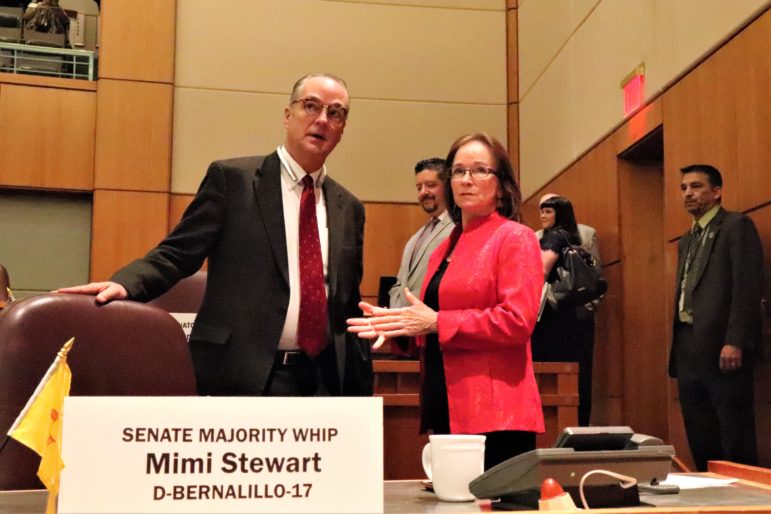The trauma Abrianna Morales, 16, experienced from sexual assault last year was compounded by isolation she felt during her recovery . There was no resource group or program specifically directed toward teens and youth.
“I felt very alone, very isolated, having to deal with the ptsd, the trauma, all by myself,” Morales said. “I was sitting one day watching television and the character had to report a sexual assault, and it occurred to me, I didn’t know how to report a sexual assault.”
With the help of her parents she properly reported her case, but realized that not all young people who’ve been sexually assaulted have support from their parents. So she decided to do something about it. Morales established the Las Cruces-based Sexual Assault Youth Support Network (SAYSN) last June, with children and teens in mind and to focus on their empowerment through legal and social support.
Morales hopes to create an inclusive, safe, and resourceful community that is specifically for young sexual assault survivors.
“The resources that are specifically directed to our teen or youth survivors are very limited,” Morales said. “So creating a new frontier on how we handle sexual assault with youth and how to support them is imperative to making sure we promote mental health recovery, coping and healing.”
Sexual assault happens at an early age for a large percentage of victims in New Mexico. “Rape is a crime of opportunity and that opportunity presents itself most often among the vulnerable,” notes the authors of a 2016 report on sex crimes from the New Mexico Interpersonal Violence Data Central Repository.
The report, produced by the New Mexico Coalition of Sexual Assault Programs, states that 53% of rape victims in law enforcement cases were under the age of 18. And almost half of all sexual assault survivors had experienced prior victimization. These data points inform recommendations by NMCSAP that sexual abuse training be provided to elementary and high school students, and that school counselors and nurses receive training on how to recognize sexual assault.

Danielle Prokop
Sen. Mimi Stewart on the House floor, 2018.
Senator Mimi Stewart, D-Albuquerque, has introduced Senate Bill 31 to appropriate $100,000 to the Public Education Department (PED) to fund training to help administrators and teachers recognize and report sexual assault allegations. The bill is currently waiting to be heard in the Senate Finance Committee.
During the 2014 legislative session, legislators passed a bill that required administrators and teachers to complete similar training but it wasn’t funded, because an online training course is available.
“I believe that we really need to do much more with the issue around sexual assault which is much more prevalent than people will admit,” Stewart said. “You know the #MeToo Movement comes to mind. I certainly, my background, my childhood was very problematic and I had those issues happen to me when I was a child. I didn’t talk to anybody at school, and I want that to change.”
A retired teacher, Stewart has seen evidence of abuse first hand.
“I’ve seen cigarette marks on children’s arms—things like that. But sexual abuse is much more difficult. It could be strange behaviors that a teacher may want to rein in without understanding where that behavior is coming from,” she said. “…teachers and principals really need better and more expertise and training of what to look for when they see these kinds of behaviors, the understanding of what those behaviors might reflect and then the necessity of having to report it to the authorities.”
Sexual assault and harassment allegations surfaced last year against Hollywood producer, Harvey Weinstein, sparking a national movement against sexual harassment and assault. Actress Alyssa Milano on Twitter urged women to share their personal stories if they too have been sexually assaulted, utilizing the #MeToo hashtag.
The hashtag derives from the Me Too campaign created by Tarana Burke in 2006 to “…help survivors of sexual violence, particularly young women of color from low wealth communities, find pathways to healing. Using the idea of “empowerment through empathy,” the me too. movement was ultimately created to ensure survivors know they’re not alone in their journey.”
SAYSN was founded before #MeToo went viral. Morales finds it hopeful.
“We can take both a proactive and reactive role in stopping sexual assault,” she said. “I think that those in Hollywood have made very large strides to expose sexual assault in the entertainment industry, and by doing so, have shed light on sexual misconduct.”
Morales said she wants to let young survivors know they are not alone.
“Even if they feel as if their experiences isolate them, there are so many others that are willing and able to support them, listen to them and understand them. And with that, I’d like to reaffirm that you are not defined by your trauma, but rather by the actions you take to overcome it,” she said.
Xchelzin Peña holds New Mexico In Depth’s 2017/2018 fellowship for a current or recently graduated journalism student at New Mexico State University.
______________________________________________
Your support makes in depth, investigative journalism possible